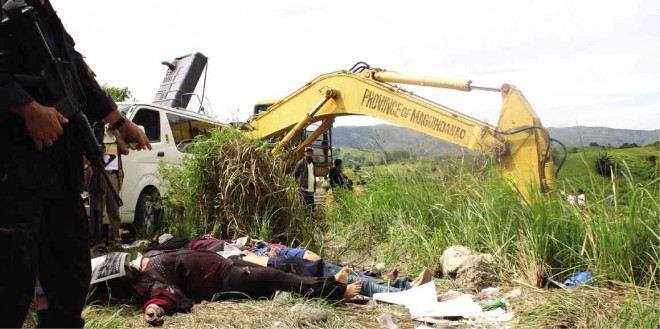
NOV. 23, 2009 Some of the bodies of the 58 victims of the mass murder lie on a hill in the town of Ampatuan, Maguindanao province. INQUIRER FILE PHOTO
(First of two parts)
GENERAL SANTOS CITY—Five years after the mass murder of 58 persons—32 of them media workers—on the hills of Masalay in Ampatuan town, Maguindanao province, the slow grind of justice is about to be overtaken by the winds of change in a region that has been described as a failed experiment in autonomy.
The change taking shape may yet alter the landscape of impunity that led to the Nov. 23, 2009, cold-blooded killings of innocent people allegedly by key members and followers of the Ampatuan clan, one of the region’s most powerful.
At the time of the massacre, considered as the country’s worst political killings, the government and the Moro Islamic Liberation Front (MILF) are trying to repair the peace process, which was all but shattered by the rejection by the Supreme Court of the memorandum of agreement on ancestral domain that was offered by the Arroyo administration to and accepted by the MILF.
Today, the peace process is drawing nearer to ending a 40-year rebellion that has been anchored on self-determination by the Moro people. That rebellion was used to justify arming the Ampatuan clan and allowing them to keep a private army of 2,000 to 5,000 militiamen, soldiers and policemen.
In a 2010 report, “They Own the People,” international group Human Rights Watch (HRW) said the Armed Forces of the Philippines had used so-called force multipliers to fight Moro guerrillas. The Ampatuan’s army became one of these.
In many cases, however, the armed militias simply became the protectors and enforcers of political clans, according to Monina Arevalo-Zeñarosa, retired justice and chair of Independent Commission Against Private Armies (Icapa).
“[Local governments] create civilian armed groups, thereby providing a cloak of legitimacy to the actions of these groups, which are presumed to be acting in accordance with their official duties, when more often than not they simply do the bidding of their political godfathers,” Zeñarosa was quoted in the HRW report.
Icapa was organized in December 2009 in the wake of the Ampatuan massacre. Its task included recommending steps that needed to be taken to disband private armed groups nationwide to prevent them from influencing the outcome of the 2010 general elections in areas where they reigned.
HRW said that through their private army, the Ampatuans “controlled life and death in Maguindanao province for more than two decades.”
Two key members of the clan are principal suspects in the massacre—Andal Ampatuan Sr., then Maguindanao governor, and Andal Ampatuan Jr., aka Datu Unsay, then mayor of a town named after him in Maguindanao and the then governor’s son.
Ampatuan Sr. had “anointed” his junior to be the next governor, so when the convoy of supporters and media men on Nov. 30, 2009, dared to challenge the Ampatuan rule by traveling to file a certificate of candidacy for now Gov. Esmael “Toto” Mangudadatu, all hell broke loose.
The Ampatuans were bent on preventing Mangudadatu, then vice mayor of Buluan town, also in Maguindanao, from even filing a certificate of candidacy to challenge Ampatuan Jr.’s ascent to the governor’s seat.
To be certain of victory, the Ampatuans did not want any other candidate to run against Ampatuan Jr.
Suwaib Upham, former Ampatuan militia member, summed it up for HRW: “In Maguindanao, the word of the Ampatuans was the law. It was either you say ‘yes’ to [them], or you get yourself killed for daring to say ‘no.’”
With change looming in the horizon as a result of the peace process, will the likes of the Ampatuans be able to continue reigning?
Removing rebellion as a justification for militias like those under the control of the Ampatuans is a clear intention of the peace process.
The Comprehensive Agreement on the Bangsamoro may be the answer to the proliferation of guns in the hands of local private armies. (To be concluded)

